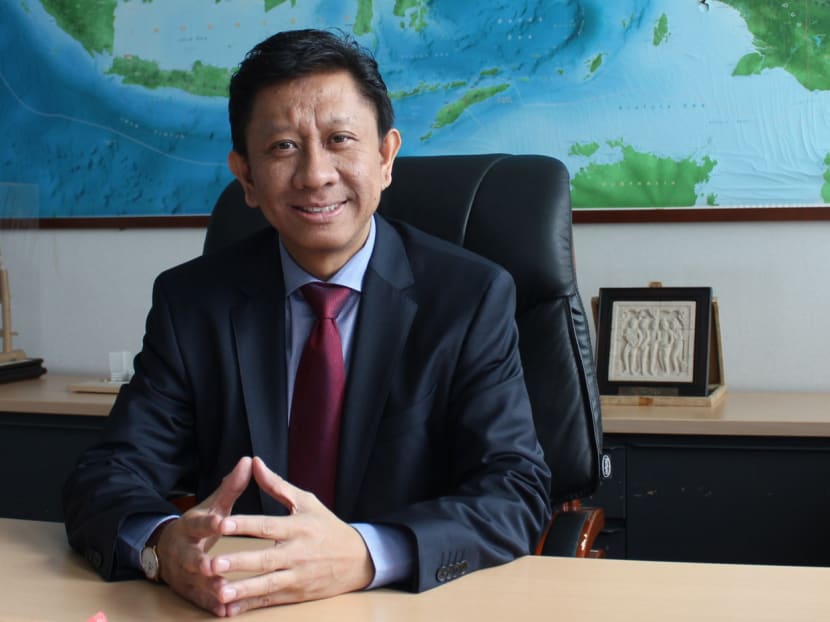PE2017: High-flyer in Malay community on why he didn’t take the plunge
SINGAPORE — Amid public criticism of eligible Malay candidates who did not step forward for the Presidential Election (PE), PT Trans Retail (Carrefour Indonesia) chief executive Shafie Shamsuddin yesterday broke his silence and revealed that he had “thought deeply” about contesting.

When asked why he did not step forward to contest the Presidential Election, PT Trans Retail (Carrefour Indonesia) chief executive Shafie Shamsuddin said he still had much to learn and improve himself. Photo: Shafie Shamsuddin
SINGAPORE — Amid public criticism of eligible Malay candidates who did not step forward for the Presidential Election (PE), PT Trans Retail (Carrefour Indonesia) chief executive Shafie Shamsuddin yesterday broke his silence and revealed that he had “thought deeply” about contesting.
Explaining why he decided against running for the highest office in the land, Mr Shafie told TODAY: “As a fellow Singaporean who cares, I have contributed in various ways, through non-political channels ... To satisfy the financial criterion as a Presidential candidate is important, but more important is the character and temperament of a leader ... I am 47 years old and there is so much more that I have to learn and improve myself first.”
Even though he had long been touted as a potential candidate, Mr Shafie had shied away from media attention. However, it was now necessary to speak out, he said.
His comments came after some observers had expressed disappointment over the lack of eligible candidates for the election, which will see former Speaker of Parliament Halimah Yacob, 63 — who is the sole eligible candidate — declared as Singapore’s eighth President if she successfully files her nomination papers today.
“What I am disappointed in is that there were clearly other candidates who could automatically qualify but didn’t put themselves forward,” former Nominated Member of Parliament Calvin Cheng wrote on Facebook.
Chairman of marine services provider Bourbon Offshore Asia Pacific Farid Khan, 62, and chief executive of Second Chance Properties Mohamed Salleh Marican, 67, were rejected by the Presidential Elections Committee (PEC).
Under the amended Elected Presidency scheme, a prospective candidate from the private sector must have served as chief executive of a company with at least S$500 million in shareholder equity for at least three years, among other requirements. The companies of both Mr Farid and Mr Marican did not meet this requirement, although the PEC had the discretion to certify them to stand for election.
Mr Shafie said his firm would satisfy the criterion, noting that Singapore sovereign wealth fund GIC had bought 17 per cent of his company for more than S$500 million early last year.
Another potential candidate who was expected to be deemed eligible was Bank of Singapore chief executive Mr Bahren Shaari, 54. Mr Bahren previously said he was focused on growing the business when asked if he was keen on the election.
However, observers, including Malay community leaders, pointed out that it was difficult for private-sector candidates to take the plunge, in contrast to those who were already serving in the public sector. The situation was compounded by the fact that prospective private-sector candidates did not have a lot of time to mull over a decision and prepare themselves, they noted, given that the constitutional changes to the Elected Presidency — which included having a hiatus triggered mechanism to ensure minority representation — were passed by Parliament only last November.
Still, the outcome has reinforced the view that there are a small number of Malays in the private sector who would make the cut. The pool is further narrowed when taking into account those who are willing to step forward, noted Taman Bacaan president Abdul Halim Kader, who was part of Mr Marican’s campaign team. He added: “If (the Government) had announced (the reserved election) five years back, I believe potential candidates would have given more thought and be prepared.”
Lawyer Nizam Ismail, former director of the Association of Muslim Professionals (AMP), pointed out that an eligible private sector candidate would, in all likelihood, be someone running a “very successful and sizeable enterprise” and there would be personal trade-offs involved to “assume a role which essentially has very limited responsibilities”. For prospective public sector candidates, becoming President would be a “continuation of public service”, said former AMP chairman Azmoon Ahmad.
Mr Nizam said the walkover cannot be said to be a “win for the (Malay) community”. Other observers said it could even reinforce the perception that the community was “lagging” behind others, given the lack of eligible candidates.
However, Mr Shafie stressed that the S$500 million criterion — which was raised from S$100 million previously — was “only one form of measurement”. “I believe we are learning to accept that there are other factors to measure our true success ... As such our community and nation should continue to nurture a more holistic progress,” he said.
Calling for unity, he urged the public to “stay united as one country and learn from this experience”.
“We should wish Mdm Halimah all the best as she aspires to serve our nation, as the citizens’ President,” he said.









